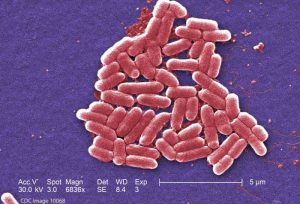Noted food safety attorney Fred Pritzker, who is representing a young man sickened in the E. coli O111 outbreak associated with food served at Applebee’s restaurants in Minnesota, has some thoughts on the topic. Early reports are that those sickened may have eaten the Oriental Chicken Salad served at the restaurants. That item has been removed from the menu.
 Pritzker said, “this is a significant outbreak for several reasons. The outbreak strain of E. coli, O111, is very rare and hasn’t been seen in the United States before this occasion. Many labs don’t test for this particular strain of E. coli, so many people who may have gone to the doctor could have been misdiagnosed and the outbreak could be much larger than first indicated.”
Pritzker said, “this is a significant outbreak for several reasons. The outbreak strain of E. coli, O111, is very rare and hasn’t been seen in the United States before this occasion. Many labs don’t test for this particular strain of E. coli, so many people who may have gone to the doctor could have been misdiagnosed and the outbreak could be much larger than first indicated.”
Second, the most likely culprit is a fresh vegetable in the salad. Chicken is not a typical carrier of E. coli bacteria, since it is found in the digestive tracts of mammals and ruminant animals. If the contaminated food is a vegetable, it would not have been heated, or put through a “kill step” to destroy pathogenic bacteria before it is served to the public.
And third, if vegetables are involved, the distribution of the contaminated product could be much wider than just Applebee’s restaurants in Minnesota or the upper Midwest. That could explain why 6 of the 13 cases in Minnesota did not eat at Applebee’s restaurants before they became ill. When fresh produce is associated or linked to E. coli outbreaks in the past, that food is usually shipped across the country. Several outbreaks traced back to salads have followed this trajectory.

Attorney Fred Pritzker, who has represented clients sickened with E. coli – HUS infections, said, “No one should ever get sick because they decided to go to a restaurant to eat.” Call 1-888-377-8900.
Transparency is essential in these outbreaks. Any public health official investigating this current outbreak should promptly tell the public about distribution chains and where the contaminated product may have been sold, Pritzker said. Anyone who has been sick with the symptoms of an E. coli infection in the past few weeks, which include severe abdominal and stomach cramps, watery and/or bloody diarrhea, and vomiting, should see a doctor immediately. Tell him about this outbreak and ask to be tested for E. coli O111, especially if you ate a ready-to-eat salad purchased from a restaurant, deli, or grocery store.




